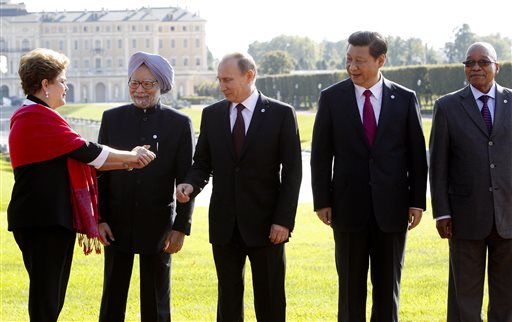Emerging nations plan their own World Bank, IMF

In this Sept. 5, 2013 file photo, from left, Brazil’s President Dilma Rousseff gestures to then Indian Prime Minister Manmohan Singh, Russia’s President Vladimir Putin, China’s President Xi Jinping and South African President Jacob Zuma, as they gather for a group photo after a BRICS leaders’ meeting at the G-20 Summit in St. Petersburg, Russia. AP
WASHINGTON — Fed up with U.S. dominance of the global financial system, five emerging market powers this week will launch their own versions of the World Bank and the International Monetary Fund.
Brazil, Russia, India, China and South Africa —the so-called BRICS countries — are seeking “alternatives to the existing world order,” said Harold Trinkunas, director of the Latin America Initiative at the Brookings Institution.
At a summit Tuesday through Thursday in Brazil, the five countries will unveil their version of the IMF: a $100 billion fund to fight financial crises, called the Contingent Reserve Arrangement. They will also launch a World Bank alternative, a new bank that will make loans for infrastructure projects across the developing world. The IMF has assets of more than $300 billion; the World Bank, $490 billion.
The five BRICS countries will each invest $10 billion in the lender, tentatively called the New Development Bank. Another $50 billion is expected to come as other countries sign up.
The BRICS powers are still jousting over the location of the bank’s headquarters — Shanghai, Moscow, New Delhi or Johannesburg. The headquarters skirmish is part of a larger struggle to keep China, the world’s second-biggest economy, from dominating the new bank the way the United States has dominated the World Bank, which is based in Washington.
Article continues after this advertisementThe bloc comprises countries with vastly different economies, foreign policy aims and political systems — from India’s raucous democracy to China’s one-party state.
Article continues after this advertisementWhatever their differences, the BRICS countries have a shared desire for a bigger voice in global economic policy. After decades of rapid growth, the five countries account for nearly one-fifth of world economic activity. Each has had painful experiences with Western financial dominance: They’ve contended with economic sanctions imposed by Western powers. Or they’ve been forced to make painful budget cuts and meet other strict conditions to qualify for emergency IMF loans.
Russia was burdened with multi-billion dollar debt in the 1990s but paid it down in the early 2000s. It has since been reluctant to borrow or to seek assistance from the IMF or other Western financial institutions, which are widely seen in Russia as predators.
“China actively supports the establishment of the BRICS Development Bank and the contingency reserve as soon as possible to give the BRIC countries their own safety net,” Li Baodong, a deputy foreign minister from China, said last week.
Developing countries have also been frustrated because the U.S. Congress has refused to approve legislation providing extra money to help the IMF make more loans to countries in trouble. The money is part of a broader reform program that would give China and other developing countries more voting power at the IMF.
The new financial institutions arrive as developing countries contend with slower economic growth. They also are vulnerable to financial shocks as the U.S. Federal Reserve scales back massive bond purchases meant to stimulate the U.S. economy. As the Fed’s easy money policies diminish, U.S. interest rates are likely to rise and draw money away from emerging markets and back to the United States. That could rattle financial markets in the developing world, driving stock prices and currencies down.
“We agreed that it’s important in the current conditions of the capital flight to have this reserve, a kind of mini-IMF,” Russian Finance Minister Anton Siluanov said before he went to Latin America with President Vladimir Putin. “The fund will be in a position to react promptly to capital outflows, providing liquidity in hard currency, in dollars, in this case.”
Before leaving for the summit Sunday, new Indian Prime Minister Narendra Modi acknowledged that “many emerging economies have experienced a slowdown, which has increased the challenge of pursuing inclusive and sustainable economic development.”
Uri Dadush, an economist with the Carnegie Endowment for International Peace, sees no problem with the BRICS countries’ development bank and financial crisis fund. But he worries that the five countries’ decision to go outside of existing institutions provides more evidence of the “fracturing of the postwar (economic) system that gave us so much peace and prosperity. The system has not been able to adapt to the new reality, the rise of the new powers.”
The IMF and the World Bank seem to be taking the new challengers in stride.
“All initiatives that seek to strengthen the network of multilateral lending institutions and increase the available financing for development and infrastructure are welcome,” said IMF spokeswoman Conny Lotze. “What is important is that any new institutions complement the existing ones.”
Answering a question about the BRICS development bank earlier this month, World Bank President Jim Kim said: “We welcome any new organizations … We think that the need for new investments in infrastructure is massive, and we think that we can work very well and cooperatively with any of these new banks once they become a reality.”